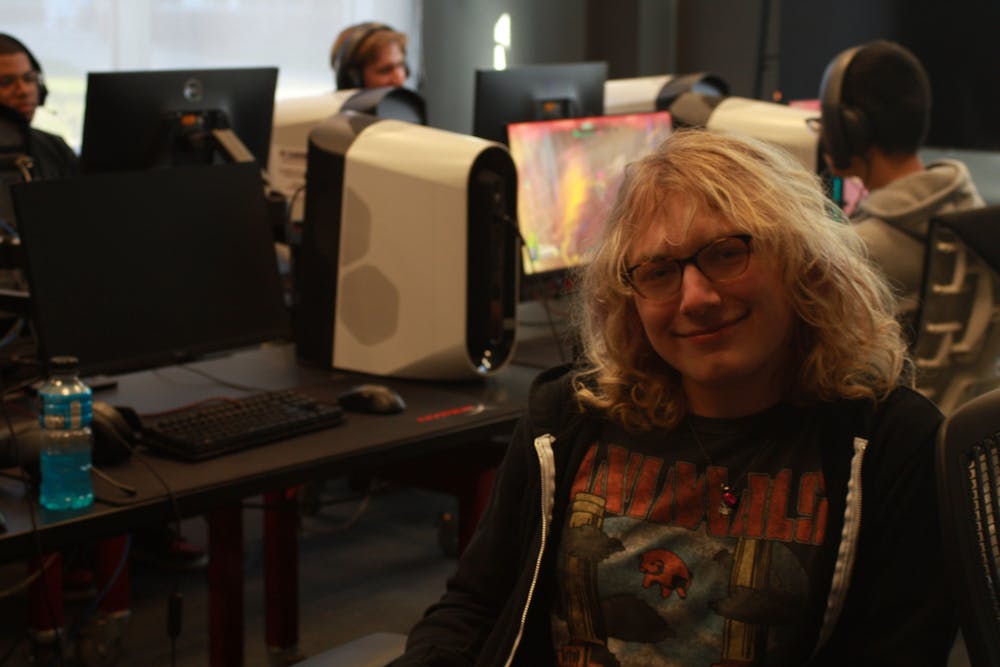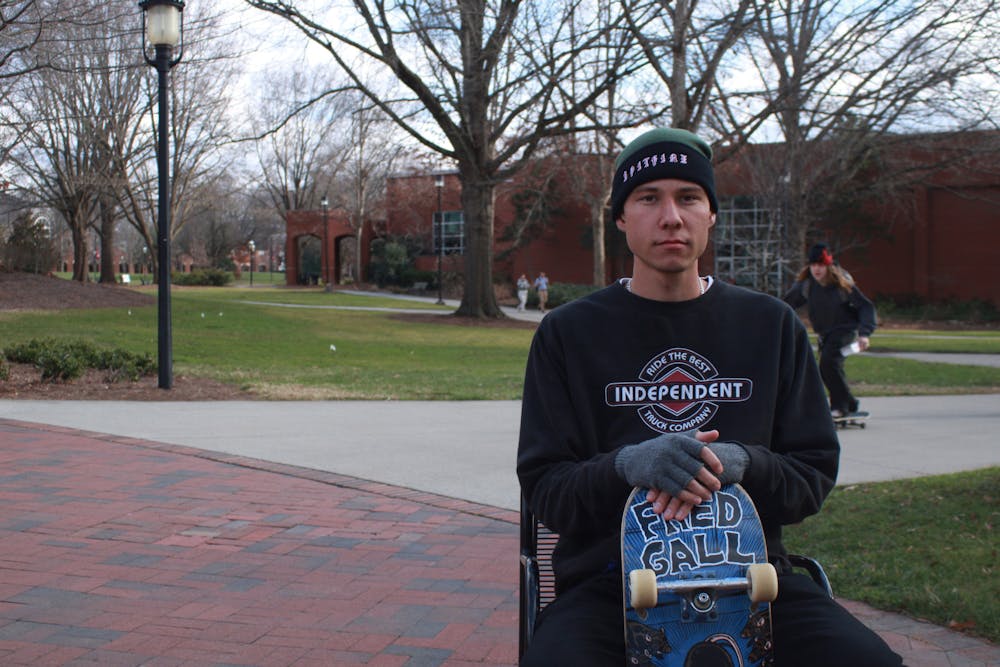Gen Z is the loneliest generation to ever attend college.
In 2023, A Cigna report found that Gen Z was “far lonelier” than older generations, in Cigna’s most recent loneliness index, 79% of young adults feel lonely.
For many of us, this is not surprising at all.
One explanation is that we are the generation with the most media at our fingertips. According to dcdx, a Gen Z advocacy organization, our average daily screen time is seven hours and seven minutes. We spend well over one-third of our waking hours on our phones. We are at a point where we find our minds sinking inward. There is more space to get lost in, and it’s common to feel like you are sinking inside the more time you spend on a phone, or in front of a laptop.
Sinking into other worlds leaves us struggling to acknowledge our own. The conventional idea is that college is the time to meet people and get out of your comfort zone. Instead, technology overuse can result in lives contrary to what college represents.
Our generation lives between two worlds. Focus your mind on a walk through campus. You will see in corners the flecks of handled light and the traces of silent routines. The loneliest students simply slip out of view. Many students inhabit another world. They drift from our social reality. There is a piece of college missing. It all amounts to a big picture with a big question — who are these missing students?
These students are ourselves and others. Elon has a vivid social life, but students are more or less fighting that battle between technology and reality. Some are the victims of its infinite imagination. Some win and some lose.
‘Can’t plug into real life’
Elon students have different philosophies and strategies to handle their tech use.
Freshman Grace Luebbe spends her time in the Elon esports room, a dedicated gaming space. She thought there was an “absolute connection” between loneliness and media use.
“When you have warped social interactions, loneliness is your brain’s feeling that this isn’t natural,” Luebbe said.

Grace Luebbe, a freshman who enjoys time in the game room, said Gen Z's tech use can cause loneliness if used for the wrong reasons.
Luebbe said loneliness came from an unhealthy use of warped, anonymous perspective caused by technology. She said those worse off are groups of lonely people who are “terminally online.”
Rates of being terminally online, a state of non-stop internet use, are increasing. According to 2023 from the Pew Research Center, 18 to 29 year-olds constantly online has risen from 39 to 62% since 2015.
“I think it’s the longer you spend surrounded by digital people, the more that’s what you are used to,” Leubbe said. “That's how your brain rewires to think.”
Luebbe said being terminally online creates entire groups that “can’t plug into real life.”
The loneliest point in Luebbe’s life was the COVID-19 pandemic. She said her social life was ruined by the isolation of the pandemic.
“I had my one group of friends that I played games with and that was it,” Luebbe said.
Luebbe has since made many friends in the game room and has more or less found her place.
She said the best way to balance your media use is to read your emotions to learn what is healthy for the mind.
“Feelings are information,” Luebbe said. “They are your body’s way of telling you what you are doing is unhealthy.”
At the time of the interview, Luebbe’s screen time sat at six hours a day.
Social media use can sometimes feel like an obligation in college life. According to the Pew Research Center, 84% of adults aged 18 to 29 use social media. It can function as a way to connect, but it often doesn't serve that purpose.
Sophomore Chloe Schuster said being in her sorority — Zeta Tau Alpha — she could feel an obligation to post often, especially during and after sorority recruitment.
“Sometimes the older girls will tell us to post other things, " Schuster said, “There definitely can be some pressure around this time.”
Schuster said excessive tech use causes loneliness since there is less in-person connection. She believes this is true because “the more that you are alone, the more you use technology.”
Schuster had a daily screen time of around five hours.
The effects of loneliness and media use are bigger than individuals. From this perspective, in terms of history, loneliness and fate, Gen Z is in new territory.
Ilyssa Salomon is a professor of psychology who has focused a portion of her research on the effects of media use. Salomon approached loneliness with a scientific uncertainty about the future.
“We are still figuring it out. It’s happening now,” Salomon said. “Now, It’s not only kids on their phones, it's parents on their phones too.”
Salomon said there is research showing a correlation between loneliness and time spent online.
“Media usage can be very passive, but theoretically, it’s never really passive,” Salomon said.
‘50% human and 50% reality’
Junior Evan Purnell has seriously cut back on his tech use. As an avid skater, Purnell is often on his board in the sunlight of Medallion Plaza. By deleting Instagram off his phone, he cut his daily screen time from between four and six hours to one hour and 30 minutes. He said if he ever has to check his social media, he does it on his laptop.
“Just go outside for a little bit. Like it's proven that going outside really helps your mental health,” Purnell said.
He said it was hard to give advice on a topic that depended on personal motivation.
“I think it is hard for them to realize it because they are still so addicted to it,” Purnell said. “You have to realize that it is an issue.”
Purnell said he considered watching TV and being on technology “time wasters.” He instead values time spent outside and following his hobbies like photography. He said his hobbies made it easier for him to find community.
Data from an A/B consumer study found that screen time was a consistent driver of loneliness. According to the report, we are “50% human and 50% technology.”
To sophomore Carina Kaplan, the phone represents a balance between expectation and reality,
and she believes in striking a balance between the two.
“People keep telling you, ‘Oh, college is what you make of it,’” Kaplan said. “So, social situations are an opportunity, not a guarantee.”
Kaplan said she would stay in bed and scroll before she started regulating her phone use. She tries to not look at her phone first thing in the morning now, instead choosing to do her morning chores first. Even with this change, however, her screen time was nine hours and four minutes.
Ending a life of split moments
Last year, the United States surgeon general said loneliness was as bad for your health as smoking 15 cigarettes a day. Once you reach the bottom of the well, reading facts like these, you realize the sheer mass of information available. This can be either encouraging or worrying. Our generation has knowledge about how to live a life of moments, yet we haven't done much about it. We are transfixed.
A 2014 study on college students and internet addiction reads like a prophecy. The study found a “worrisome vicious cycle” between loneliness and internet addiction among college-age adults. Facts like that are common knowledge now. We know this, and we intuited it long ago.
There is always a possibility present. Those towering rates of loneliness are caused by splitting the world and its moments. Through the conversations I had, I learned that the line between fantasy and reality is meant to be walked.
I deleted Instagram from my phone after my conversation with Purnell. I definitely watch a few reels on my computer, but it is a step in the right direction. The other day, while walking to the Moseley Center, I stared up at the night sky and peered for a moment. It felt new.
Sinking into other people’s worlds will numb your own. Many still have the urge to call loneliness an epidemic. Somehow, we haven’t left that mindset. That perspective hurts us. When we think of loneliness as something to be caught or something that spreads and festers, it becomes completely out of our control.
The loneliness of our generation is a complex issue with no simple fix. But balancing your media intake and learning to walk between both words will make your world — your life — more real and vital. Being mindful of your fantasy and reality is always a step.
One of the best quotes I heard was in a place I didn’t expect it. In the esports room, Luebbe said, “If you look at the most basic phone, you are not hearing a voice, you’re hearing a recreation of that voice,” “It's compression, something sent across miles and miles… a computer can’t be a real human. It can’t give you a real human voice. It’s never going to.”
You can only feel warmth when it is close. It can’t bend across miles into your dorm.
Leubbe later said, “The human brain is stronger than computers.”
Let’s hope so. Let’s hope we aren't the victims of imagination.


